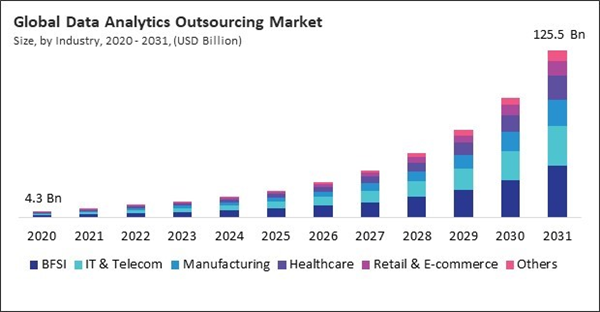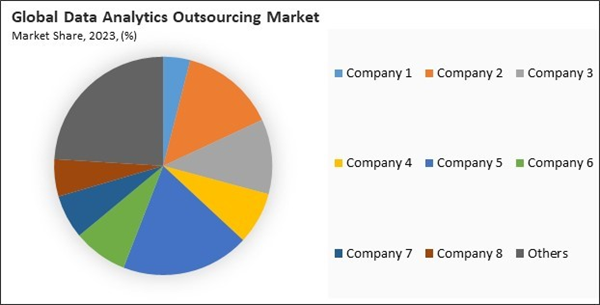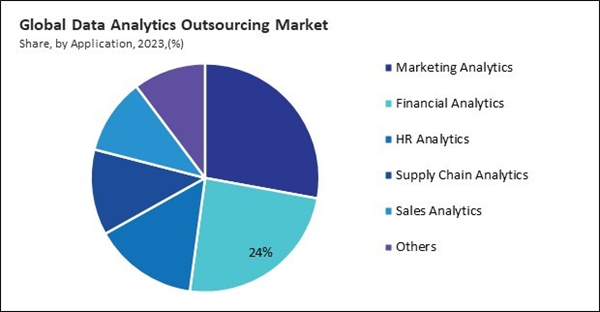Effective supply chain management requires real-time insights into inventory levels, supplier performance, and logistics. Outsourcing helps manufacturers comprehensively view their supply chain, leading to better coordination and reduced disruptions. Manufacturers seek to optimize production processes to enhance efficiency, reduce downtime, and minimize waste. Outsourcing allows access to specialized analytics to identify process inefficiencies, predict maintenance needs, and improve overall operational performance. Thus, the manufacturing segment acquired 15% revenue share in the data analytics outsourcing market in 2023.
Service providers often have expertise in the latest analytical methods, machine learning, and big data technologies, enabling organizations to leverage these capabilities without investing heavily in training or technology. In conclusion, exponential data volume and complexity growth drive the market's growth.
Additionally, Outsourcing provides the necessary support to ensure real-time data insights are consistently available and actionable. Thus, the rising demand for real-time data analytics and decision-making propels the market's growth.
Data migration issues such as data loss, corruption, or transformation errors can affect the quality and reliability of analytics results. Integrating external analytics solutions into existing business processes can disrupt established workflows. Organizations may need to adjust their internal processes to accommodate the new system, which can lead to temporary inefficiencies or resistance from staff. Therefore, integration difficulties with in-house systems and processes hinder the market's growth.
The leading players in the market are competing with diverse innovative offerings to remain competitive in the market. The above illustration shows the percentage of revenue shared by some of the leading companies in the market. The leading players of the market are adopting various strategies in order to cater demand coming from the different industries. The key developmental strategies in the market are Acquisitions, and Partnerships & Collaborations.
Driving and Restraining Factors
Drivers
- Exponential growth in data volume and complexity
- Rising demand for real-time data analytics and decision-making
- Accelerated digital transformation initiatives across industries
Restraints
- Concerns over data security and confidentiality risks
- Integration difficulties with in-house systems and processes
Opportunities
- Analytics for autonomous systems and robotics
- Exploration of analytics in quantum computing
Challenges
- Potential for misalignment with business objectives and needs
- Challenges in maintaining data consistency
Application Outlook
Based on application, the market is divided into marketing analytics, financial analytics, HR analytics, supply chain analytics, sales analytics, and others. In 2023, the HR analytics segment held 15% revenue share in the market. Outsourcing HR analytics allows HR departments to focus on core activities such as employee relations, recruitment, and strategic planning while relying on external experts for complex data analysis and reporting.Industry Outlook
On the basis of industry, the market is segmented into BFSI, IT & telecom, manufacturing, healthcare, retail & e-commerce, and others. In 2023, the IT & telecom segment attained 25% revenue share in the data analytics outsourcing market. IT and telecom companies often operate globally and require insights into international markets and regional trends.Regional Outlook
Region-wise, the data analytics outsourcing market is analyzed across North America, Europe, Asia Pacific, and LAMEA. In 2023, the Europe region generated 30% revenue share in the data analytics outsourcing market. European businesses are increasingly focused on digital transformation, which includes adopting advanced data analytics to drive innovation and improve operational efficiency.List of Key Companies Profiled
- Accenture PLC
- IBM Corporation
- Infosys Limited
- Wipro Limited
- Capgemini SE
- Deloitte Touche Tohmatsu Limited
- Pricewaterhousecoopers LLP (PwC)
- Cognizant Technology Solutions Corporation
- Genpact Limited
- ZS Associates
Market Report Segmentation
By Industry
- BFSI
- IT & Telecom
- Manufacturing
- Healthcare
- Retail & E-commerce
- Others
By Application
- Marketing Analytics
- Financial Analytics
- HR Analytics
- Supply Chain Analytics
- Sales Analytics
- Others
By Geography
- North America
- US
- Canada
- Mexico
- Rest of North America
- Europe
- Germany
- UK
- France
- Russia
- Spain
- Italy
- Rest of Europe
- Asia Pacific
- China
- Japan
- India
- South Korea
- Australia
- Malaysia
- Rest of Asia Pacific
- LAMEA
- Brazil
- Argentina
- UAE
- Saudi Arabia
- South Africa
- Nigeria
- Rest of LAMEA
Table of Contents
Companies Mentioned
- Accenture PLC
- IBM Corporation
- Infosys Limited
- Wipro Limited
- Capgemini SE
- Deloitte Touche Tohmatsu Limited
- Pricewaterhousecoopers LLP (PwC)
- Cognizant Technology Solutions Corporation
- Genpact Limited
- ZS Associates











